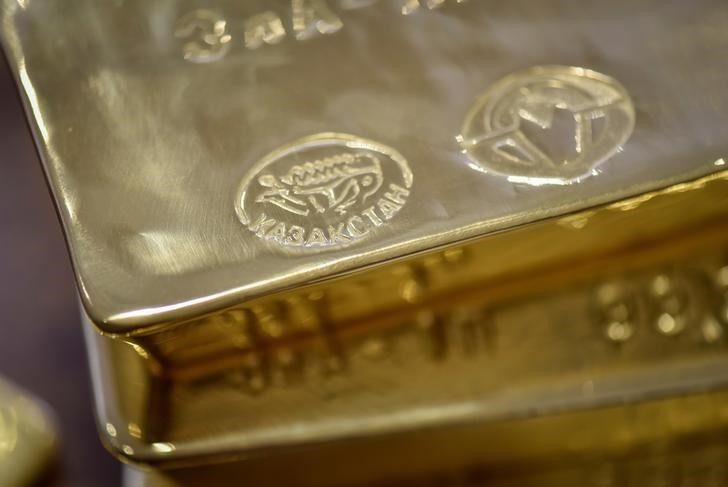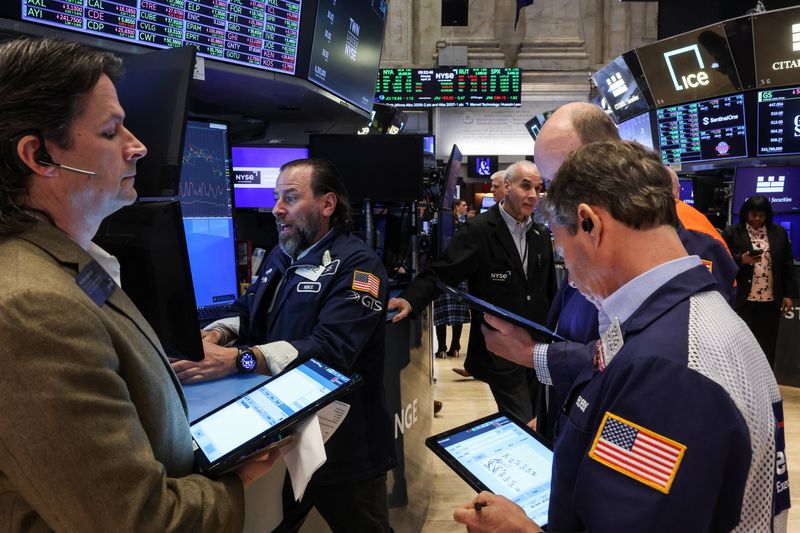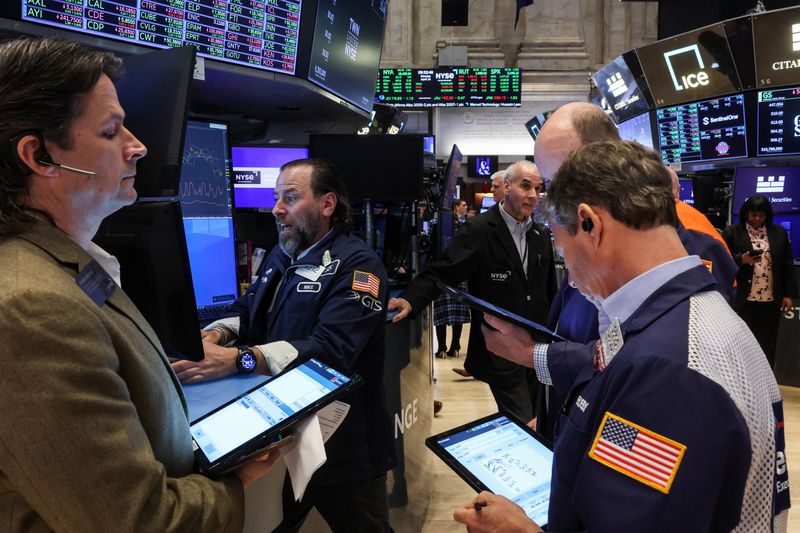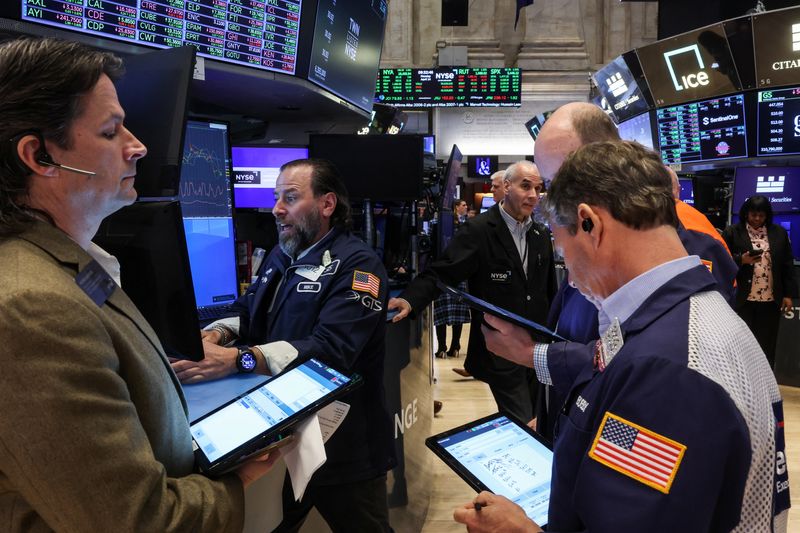Select Language

Gold prices hit a record high above $5,200 an ounce on Wednesday as strong haven demand and prolonged weakness in the dollar benefited metal markets.
Other precious metals also remained upbeat, with silver and platinum both remaining close to recent record highs. Haven demand was underpinned by caution before the conclusion of a Federal Reserve meeting later in the day.
Spot gold jumped to a record high of $5,266.38/oz, while gold futures for April hit a peak of $5,297.86/oz.
Gold aided by geopolitical tensions, policy uncertainty
Demand for havens remained strong after U.S. President Donald Trump said there was a second armada headed towards Iran, and that he hoped the country would accept a deal with Washington.
Uncertainty over U.S. policy has been a major driver of gold’s rally this year, as an incursion in Venezuela and a spat over Greenland drummed up global geopolitical tensions. The yellow metal is trading up about 20% so far in 2026, after clocking stellar gains in the prior year.
Weakness in the dollar also benefited gold and metal markets, with the greenback sliding to a near four-year low this week. Trump on Tuesday indicated that he was unconcerned by a weaker dollar-- a move that sparked even deeper losses in the currency.
Silver, platinum prices upbeat as Fed meeting looms
Broader metal prices also remained largely upbeat and close to recent record highs as risk aversion and weakness in the dollar drove demand for physical assets.
Spot silver jumped 2.8% to $115.2455/oz, while spot platinum rose 1.3% to $2,688.23/oz.
ANZ analysts said in a note that silver was a major beneficiary of physical demand in China, where investors had relatively limited options to invest in for metals exposure and could only buy bars and coins of the white metal.
Gains in metals come with the Fed set to conclude a two-day meeting later in the day, where the central bank is widely expected to leave rates unchanged at 3.75%.
Focus will be squarely on Fed Chair Jerome Powell’s outlook on monetary policy, and whether the Fed chair will address recent pressure from Washington to sharply cut interest rates.
Trump said on Tuesday that he was close to naming his pick for the next Fed chair after Powell, and that interest rates will fall with new leadership at the central bank.
This comes after Powell earlier in January claimed that Washington was seeking to pressure the Fed into cutting rates through a Department of Justice investigation-- a move that sparked heightened concerns over the central bank’s independence.

U.S. stock index futures traded either side of the flatline Tuesday, as investors awaited a key Federal Reserve decision and heavyweight technology earnings.
At 05:45 ET (10:45 GMT), Dow Jones Futures traded 40 points, or 0.1% lower, while S&P 500 Futures gained 20 points, or 0.3% and Nasdaq 100 Futures rose 155 points, or 0.6%.
The main averages advanced in the prior session, with the benchmark S&P 500 and tech-heavy NASDAQ Composite both rising for a fourth straight session. Both indices touched their highest levels in over a week, and are now on their longest streak of positive sessions since December.
Fed starts policy-setting meeting
Markets are largely in a wait-and-see mode ahead of the Federal Reserve’s two-day policy meeting, which concludes on Wednesday.
This caution means that President Donald Trump’s announcement that he is raising tariffs on South Korean imports to 25% from 15%, accusing Seoul’s legislature of failing to approve a bilateral trade deal reached last year, has had little impact on sentiment.
The U.S. central bank is widely expected to leave interest rates unchanged, with policymakers seen assessing the impact of easing financial conditions, cooling inflation trends, and a labor market that has shown signs of gradual moderation.
Recent data has reinforced expectations that the Fed will avoid signaling near-term cuts, as officials seek greater confidence that inflation will move sustainably toward their 2% target.
Aside for clues about clues on the timing and pace of potential rate cuts later in the year, investors will also be looking for any updates about the identity of the next Fed governor, with Jerome Powell’s tenure set to end in May.
"Rick Rieder’s odds of replacing Powell have shot higher in recent days following some flattering press reports," said analysts at Vital Knowledge, in a note. "
Rieder is currently a senior manager at BlackRock.
That said, "regardless of who gets the nod, Fed independence will remain under threat for at least the balance of the Trump 2.0 administration as the central bank is set to continue acting as a financial scapegoat)," Vital Knowledge added.
Earnings deluge starts
Away from the Fed, attention is also firmly on the upcoming earnings season, with more than 90 S&P 500 companies slated to report.
Earnings this quarter have been strong so far, with about three out of four S&P 500 companies beating expectations, according to data from FactSet.
While results from tech giants Meta Platforms (NASDAQ:META), Tesla (NASDAQ:TSLA), Microsoft (NASDAQ:MSFT), and Apple (NASDAQ:AAPL) will likely grab the week’s headlines, Tuesday will still see some key reports before U.S. stock markets open.
Healthcare giant Unitedhealth (NYSE:UNH), aerospace firm Rtx Corp (NYSE:RTX), and planemaker Boeing (NYSE:BA) are scheduled to announce quarterly earnings before the opening bell, as well as carmaker General Motors (NYSE:GM) and shipping player United Parcel Service (NYSE:UPS).
Elsewhere, shares of several large health insurers, including Humana (NYSE:HUM) and CVS Health (NYSE:CVS), dropped sharply premarket following a proposal by the Trump administration to set near-flat payment rates for Medicare Advantage plans, disappointing markets that had expected a more generous increase.
Gold and crude rise
Gold prices rose on Tuesday after hitting a series of record highs on concerns over Trump’s trade policies and heightened global geopolitical tensions.
Anticipation ahead of the Fed meeting this week also kept markets broadly risk averse.
Spot gold last jumped 1.6% to $5,087.54 an ounce, while gold futures for April delivery fell 0.1% to $5,120.91/oz. Spot gold hit an all-time peak of $5,111.11/oz on Monday.
Oil prices also gained, helped by supply disruptions from extreme winter conditions in the U.S.
Brent futures gained 0.5% to $65.07 a barrel and U.S. West Texas Intermediate crude futures rose 0.6% to $61.01 a barrel.
A severe winter storm has swept across the U.S., straining energy infrastructure and power grids.
U.S. oil producers are estimated to have lost up to 2 million barrels per day or roughly 15% of national production over the weekend.

Gold surged past the $5,100 an ounce level on Monday, extending a blistering rally from last week as investors rushed into the safe-haven asset amid heightened geopolitical tensions.
Spot gold jumped nearly 2.5% to a new all-time high of $5,111.11/oz by 18:52 ET (00:52 GMT). U.S. Gold Futures also climbed 2.5% to a record peak of $5,145.39/oz.
Gold advanced more than 8% last week, when prices repeatedly broke historical peaks. It has already risen nearly 17% this year, driven by a combination of geopolitical risk, expectations of easier U.S. monetary policy later in 2026, and sustained demand from central banks.
Other precious metals were also upbeat on Monday. Silver prices rallied 6% to hit a record high of $109.46/oz. Platinum gained 4% to a new peak of $2,910.67/oz.
Geopolitical risks, Trump tariff threats boost gold
A major driver of gold’s surge this month has been escalating tensions between the United States and NATO allies over Greenland, which have unsettled global markets.
Trump’s rhetoric over U.S. strategic interests in the Arctic region has strained transatlantic relations, prompting concerns about broader diplomatic and economic fallout.
Compounding those geopolitical strains, Trump intensified trade friction with Canada this weekend, vowing to impose a 100% tariff on Canadian goods if Ottawa proceeds with a trade agreement with China.
Trump wrote on his social media platform that Canada could be used as a “drop off port” for Chinese goods to enter the United States and warned that Beijing would “eat Canada alive” if such a deal goes ahead
Fed rate decision on tap
Gold has also drawn support from expectations surrounding U.S. monetary policy. The Federal Reserve is due to conclude its policy meeting on Wednesday, and markets are widely anticipating that policymakers will keep interest rates on hold.
While a pause is largely priced in, investors will scrutinise the Fed’s statement and Chair Jerome Powell’s comments for clues on the timing and pace of potential rate cuts later this year.
Lower interest rates tend to support gold by reducing the opportunity cost of holding non-yielding assets.
"Both the data and Chair Powell’s robust defence of central bank independence indicate little prospect of a 28 January Fed rate cut," ING analysts said in a note.
"The focus will be on President Trump’s imminent nomination for the new Fed Chair, the upcoming data, and whether that person can corral the rest of the committee into further cuts," they added.

Intel’s shares plunged 12% on Friday after the company struggled to meet strong AI demand for data-center chips due to supply constraints, disappointing investors betting on its turnaround.
After years of sitting out the artificial intelligence boom that turned Nvidia into the world’s most valuable company, Intel is finally enjoying a demand surge for its traditional server chips that are used alongside AI processors in data centers.
That and high-profile investments from the U.S. government, SoftBank (T:9984) and Nvidia have reignited investor interest. Intel’s stock outpaced most semiconductor firms last year with an 84% gain and has extended its rally into 2026, up 47% in January so far.
But the company was caught off guard by the demand surge and cannot keep up even as it runs factories at capacity. It also warned a spike in memory chip prices could dampen sales in the PC market, where its new "Panther Lake" PC chips were expected to spark a comeback after years of market share losses to AMD .
The memory chip surge, driven by increasing AI demand, is also expected to weigh on outlook for consumer electronics firms. But Intel CFO David Zinsner said he expected available memory supply to improve in the second quarter after hitting its lowest levels in the first quarter.
Friday’s losses followed quarterly profit and revenue forecasts that were below estimates. The drop will erase about $31 billion from Intel’s market value, if the premarket moves
"The server cycle seems real, but the company appears to have woefully misjudged it with its capacity footprint caught massively off guard," said analysts at Bernstein.
The company faces a lag in changing the type of semiconductors it makes, which would hamper efforts to increase production of the more profitable data-center processors.
Investors are closely examining Intel’s turnaround under CEO Lip-Bu Tan, who has focused on cutting costs and eliminating management layers while championing a fresh product road map.
"Server market does sound better overall, but Intel has much lower share in the Cloud vs AMD and is still struggling with product issues," analysts at Jefferies said in a note.

Gold prices were largely steady in Asian trade on Thursday after hitting a record high near $4,900 per ounce in the previous session, as the retreat by U.S. President Donald Trump from tariff threats tied to Greenland tensions reduced safe-haven demand.
Spot gold edged down 0.1% to $4,826.03 an ounce by 01:19 ET (06:19 GMT), after reaching a record high of $4,888.1/oz in the previous session.
U.S. Gold Futures for March slipped 0.3% to $4,825.39/oz.
Trump eases Greenland tariff tensions
The yellow metal ticked lower after surging over 6% in the last three sessions amid heightened geopolitical risk linked to a transatlantic dispute over Greenland and threatened tariffs on European imports.
The rally this week pushed bullion close to the psychological $5,000 mark as investors sought shelter from global uncertainty.
The pullback came after Trump, speaking at the World Economic Forum in Davos, said he would not impose the tariffs and ruled out the use of force in the dispute over the Danish territory, signaling that a “framework” deal was in sight to resolve tensions with NATO allies.
“It’s a long-term deal. It’s the ultimate long-term deal. It puts everybody in a really good position, especially as it pertains to security and to minerals,” Trump told reporters.
A slight rebound in the U.S. dollar also contributed to gold’s softness for the day. The US Dollar Index traded marginally higher after rising 0.1% in the previous session.
Metal markets remain upbeat
Most other precious and industrial metals traded higher, with silver remaining near record highs on increased industrial demand.
Silver prices rose 1% to $94.03 per ounce, just below record highs of $95.89/oz hit earlier this week.
Platinum prices fell 0.8% to $2,465.10/oz.
Benchmark Copper Futures on the London Metal Exchange climbed nearly 1% to $12,855.0 a ton, while U.S. Copper Futures traded flat at $5.81 a pound.

Gold prices surged to fresh record highs on Wednesday, now approaching $4,900 an ounce levels, as escalating tensions linked to Greenland and renewed trade frictions rattled global markets and drove investors toward safe-haven assets.
Spot gold jumped 2.3% to $4,872.13 an ounce by 01:13 ET (06:13 GMT), after hitting a new all-time high of $4,878.30/oz earlier in the day.
U.S. Gold Futures also climbed 2.4% to historic highs of $4,880.50/oz.
Gold boosted by US-EU tensions over Greenland
Gold prices have jumped more than 6% this week, including today’s gains.
The latest surge came as relations between the U.S. and Europe remained strained over Greenland’s strategic importance.
U.S. President Donald Trump has insisted there is “no going back” on Greenland, citing security concerns in the Arctic, and has threatened tariffs against European countries, unsettling markets already on edge over global trade risks.
French President Emmanuel Macron said Europe would not bow to “bullies,” stressing that respect and cooperation, not coercion, should define relations between allies.
His remarks, delivered on the sidelines of the World Economic Forum in Davos, underscored growing unease in Europe over Washington’s rhetoric and trade threats tied to the Greenland dispute.
Trump sought to calm nerves by saying the U.S. was working on the issue and aimed for an outcome that would satisfy NATO, but investors remained cautious.
Weaker dollar provides further support
Investor demand for gold was further boosted by weakness in the U.S. dollar, which slid about 0.8% on Tuesday to a two-week low.
The US Dollar Index traded 0.2% lower during Asian hours on Wednesday.
A softer dollar makes gold cheaper for holders of other currencies and typically lifts demand for the non-yielding metal.
Among other precious metals, silver prices edged slightly higher to $94.75/oz after hitting a record high of $95.87/oz on Tuesday.
Platinum rose to a record high of $2,519.51/oz on Wednesday but later pared gains to trade 0.2% higher at $2,467.9/oz.
Benchmark Copper Futures on the London Metal Exchange rose 1.3% to $12,944.20 a ton, while U.S. Copper Futures gained 1% to $5.88 a pound.

Futures linked to the major U.S. stock indices point down as traders gauged the likelihood that the U.S. would slap fresh tariffs on a host of European countries over Greenland. President Donald Trump says he will hold meetings on Greenland during a visit to an annual economic forum in Switzerland, while European leaders weigh their potential responses to Trump’s demand for American ownership of the territory. Back in the U.S., the Supreme Court could unveil a ruling on the legality of Trump’s tariffs. Elsewhere, Netflix is due to report its latest results.
1. Futures dip
U.S. stock futures were lower on Tuesday, suggesting a negative start to a shortened trading week fueled by tensions over Greenland.
By 03:07 ET (08:07 GMT), the Dow futures contract had fallen by 677 points, or 1.4%, S&P 500 futures had dipped by 102 points, or 1.5%, and Nasdaq 100 futures had slumped by 449 points, or 1.8%.
The main averages on Wall Street were closed on Monday for Martin Luther King Jr. Day.
Still, the impact of President Donald Trump’s threat to slap fresh tariffs on several European countries until the U.S. is allowed to take ownership of Greenland weighed on sentiment around the world. Globally, stock markets have retreated to begin the trading week, reflecting jitters around the implications of the levies, which Trump has said will start at 10% and could rise to as much as 25% in June if his demands for the semi-autonomous Danish territory are not met.
Analysts at Capital Economics estimated that, should they be implemented and sustained for a long period, the tariffs could cost the Eurozone currency area “something between” 0.2% and 0.5% of gross domestic product, hitting traditional European powerhouse Germany particularly hard.
“In practice though, we doubt that they will be implemented as advertised. We also think the [European Union] will be cautious in any retaliation in an effort to avoid further escalation,” the analysts said.
2. Trump says he will hold Greenland meeting at Davos
Trump suggested that he would hold talks on Greenland during his visit to the World Economic Forum’s annual event in Davos, Switzerland this week.
On social media, Trump said he had held a “very good” call with North Atlantic Treaty Organization head Mark Rutte, who has long worked to keep the president on board with the longstanding alliance.
The president, who is due to speak at the yearly Alpine confab of business executives and global leaders on Wednesday, added that he would meet with “various parties” during the trip -- although he did not specify who exactly he will speak with.
“As I expressed to everyone, very plainly, Greenland is imperative for National and World Security. There can be no going back — On that, everyone agrees!” Trump wrote.
European countries have reportedly been deliberating over how best to respond to the Greenland crisis, mulling over potentially rolling out steep tariffs on 93 billion euros worth of U.S. goods. France and Germany have also urged the EU to consider implementing an instrument designed to deter economic coercion, which could include other restrictions on investment or banking activity.
U.S. access to EU -- the world’s third-biggest economy -- may be restricted by this tool. As a result, this has been viewed as a “bazooka” option for the EU, creating a deep rift between the bloc and the U.S. after the two had reached a trade agreement last summer. The future of NATO hangs in the balance as well.
3. Potential Supreme Court tariff ruling ahead
Hovering in the background is a crucial -- and long-awaited -- Supreme Court ruling on the legality of Trump’s sweeping import tariffs on a raft of countries.
Trump has used a 1977 law called the International Emergency Economic Powers Act, or IEEPA, as justification for the levies. IEEPA gives the president broad powers over international economic transactions in the event of a national emergency.
However, justices expressed enough skepticism over the White House’s arguments at hearings late last year that markets are now widely anticipating the high court will rule against Trump.
Media reports have said the decision may come down as soon as Tuesday.
But U.S. Trade Representative Jamieson Greer told the New York Times in an interview published on Monday that, even if the Supreme Court strikes down the tariffs, administration officials are preparing new duties that would “start the next day.”
4. Gold’s fresh record high
Gold prices climbed to a fresh record high on Tuesday, as concerns over American demands for Greenland kept traders broadly risk-averse and pinned to safe havens.
Prices for the yellow metal, as well as silver, soared to all-time peaks earlier this week on Trump’s latest tariff salvo. But while silver saw some profit-taking on Tuesday, bullion remained relatively well-bid.
The uncertainty also saw traders sell the U.S. dollar, which in turn aided metal prices.
Spot gold rose 1.0% to $4,724.83 an ounce, while gold futures gained 3.0% to $4,730.50/oz by 03:49 ET.
5. Netflix to report
On the earnings calendar, Netflix is due to report its latest quarterly results after the closing bell on Wall Street on Tuesday.
According to Bloomberg consensus estimates, the streaming video giant is seen posting earnings per share of $0.55 on revenue of $11.96 billion.
But the numbers will likely take a back seat to any discussion around Netflix’s drive to purchase Hollywood stalwart Warner Bros. Discovery, a bid that has been rivalled by one from Paramount Skydance. The battle for Warner Bros is anticipated to drag on for months, and possibly become mired in regulatory scrutiny in both the U.S. and Europe.
Netflix has targeted Warner Bros, whose holdings include the HBO Max streaming unit and popular franchises like “Harry Potter” and “Friends”, to help boost revenues. Despite being bolstered by the success of series like “Stranger Things” and a foray into live sports programming, Netflix faces pressure to show returns from expensive bets on advertising and video games.

Investors gear up for a week shortened by the closure of stock markets on Wall Street for Martin Luther King Jr. Day on Monday. But it will likely get busier, with President Donald Trump’s latest tariff salvo and two major Supreme Court cases in the spotlight, as well as earnings from big-name companies like Netflix and Intel. Trump’s proposal to address housing affordability could also be fleshed out, as upcoming midterm elections in November loom.
1. EU prepares response to Trump’s Greenland tariffs
European leaders are set to discuss their response to Trump’s tariffs later this week, with reports suggesting that EU officials are even mulling over instituting harsh retaliatory measures should the levies be put into place.
On Saturday, Trump said he would place 10% tariffs on eight EU members -- Denmark, Sweden, France, Germany, the Netherlands, Finland, Norway and the United Kingdom -- until the U.S. can buy Greenland. Should the U.S. not succeed in buying the massive semi-autonomous Danish territory, Trump added that the levies would increase to 25% in June.
Trump has argued that the purchase over Greenland is necessary for national security, although European states have described the move as blackmail.
Ahead of an emergency summit scheduled for Thursday in Brussels, EU countries are reportedly preparing to discuss a range of responses, such as a package of tariffs 93 billion euros of U.S. imports. Another is the so-called “Anti-Coercion Tool,” which could limit the U.S.’s access to investment, banking activity and trade in services.
Against this backdrop, analysts suggested that uncertainty around Trump’s trade policies -- a common theme throughout 2025 -- may intensify.
“If the past year has shown anything, it is that the macroeconomic effects of tariffs are both uncertain and non-linear,” said Neil Shearing, Group Chief Economist at Capital Economics, in a note.
Shearing predicted that the economic impact of the tariffs would be “modest,” shaving “a few tenths of a percentage point” off of growth in the affected economies and adding a similar amount to U.S. inflation.
But Shearing warned that the political ramifications would be “far greater,” adding that any U.S. attempts to seize Greenland either by force or coercion would inflict “potentially irreparable damage” to the NATO alliance.
2. Supreme Court cases in focus
Notably, Trump has lobbed this new tariff volley at a time when the U.S. Supreme Court is anticipated to deliver a ruling on the legality of his sweeping levies.
Markets widely expect the high court will strike down Trump’s use of an international emergency economic powers law instituted in the 1970s to impose the tariffs, with the betting website Polymarket showing only a 31% that the justices will side in his favor.
Although Trump’s aides have suggested that they will explore other avenues to institute the tariffs, analysts have flagged that even more uncertainty would cloud the fate of levies, including those Trump has just threatened to roll out over Greenland.
Meanwhile, the Supreme Court is also due on Wednesday to listen to arguments in Trump’s push to fire Federal Reserve Governor Lisa Cook.
Cook sued Trump in August after he attempted to oust her from the role over claims of mortgage fraud -- an action that many observers interpreted as part of an effort by the president undermine the independence of the Fed.
“[The Supreme Court] has been a relative friend of the Fed in terms of defending it from White House interference, and investors are hoping that remains the case during the Cook hearing,” analysts at Vital Knowledge said.
3. Netflix earnings ahead
On the earnings calendar, Netflix is due to report its latest quarterly results after the closing bell on Wall Street on Tuesday.
According to Bloomberg consensus estimates, the streaming video giant is seen posting earnings per share of $0.55 on revenue of $11.96 billion.
But the numbers will likely take a back seat to any discussion around Netflix’s drive to purchase Hollywood stalwart Warner Bros. Discovery, a bid that has been rivalled by one from Paramount Skydance. The battle for Warner Bros is anticipated to drag on for months, and possibly become mired in regulatory scrutiny in both the U.S. and Europe.
Netflix has targeted Warner Bros, whose holdings include the HBO Max streaming unit and popular franchises like “Harry Potter” and “Friends”, to help boost revenues. Despite being bolstered by the success of series like “Stranger Things” and a foray into live sports programming, Netflix faces pressure to show returns from expensive bets on advertising and video games.
4. Intel to report
Elsewhere, Intel is slated to unveil its results following the close of the U.S. markets on Thursday.
Under CEO Lip-Bu Tan, the California-based chipmaker has been push to reduce costs and shore up its finances during a time when it is grappling with intensifying competition in the PC and server central processing unit markets.
Intel’s drive to break into the artificial intelligence chip market has also failed to produce results.
But the company was given a major lifeline last year when AI-darling Nvidia, tech investment giant SoftBank and even the U.S. government stepped in with significant investments. Nvidia, in particular, bought $5 billion in Intel shares in December.
Earlier this month, Intel also announced its new AI chip for laptops, seeking to assuage investor concerns around products made using the firm’s next-generation manufacturing process.
5. More details on Trump’s housing plan expected
The Trump administration is expected to provide more details around its plans to make housing more affordable, as officials look to address one of the central issues for voters heading into key midterm elections later this year.
Housing costs have been especially on the minds of many Americans who have put off buying property due to elevated mortgage rates and high home prices.
Last week, White House economic adviser Kevin Hassett said the administration is planning to let investors use some of their retirement funds to place a down payment on a house. Hassett added that Trump “will put the final plan out” during a trip to the World Economic Forum’s annual meeting in Davos this week.
Trump has outlined a range of measures aimed at bringing down costs, including barring institutional investors from buying single-family homes, ordering mortgage titans Fannie Mae and Freddie Mac to purchase $200 billion in mortgage bonds, and a cap on credit-card interest rates.

Gold prices held largely steady on Friday, trading below record highs touched earlier this week, as strong U.S. labour market data dampened expectations of imminent Federal Reserve rate cuts, while easing geopolitical tensions around Iran reduced safe-haven demand.
Spot gold was last down 0.1% at $4,608.55 an ounce by 02:11 ET (07:11 GMT). U.S. Gold Futures edged down 0.2% to $4,611.10.
The yellow metal has retreated from a record high of $4,642.72/oz reached on Wednesday. Despite the modest pullback, bullion was still on track for a weekly gain of about 2%.
Traders assess Fed outlook after strong US data
Investor sentiment shifted after data showed U.S. initial jobless claims fell more than expected last week, underscoring the continued resilience of the labour market.
The stronger-than-anticipated reading reinforced views that the Federal Reserve may keep interest rates higher for longer, pushing market expectations for the timing of rate cuts this year.
Higher interest rates tend to reduce the appeal of non-yielding assets such as gold.
Following the data, the US Dollar Index climbed to a six-week high against a basket of major currencies, further weighing on gold prices by making the metal more expensive for overseas buyers.
Easing Iran tensions weighs on haven demand
Gold had surged earlier in the week as investors sought safety amid heightened geopolitical tensions linked to unrest in Iran.
Unrest in Iran was driven by widespread protests and government crackdowns, which had sparked fears of escalation and potential supply disruptions, lifting demand for precious metals
U.S. President Donald Trump tempered his previously hawkish rhetoric on possible military intervention, signalling a more cautious stance and noting reports that violent crackdowns on demonstrators may be easing.
Metal markets slip
Other precious and industrial metals traded lower on Friday, weighed down by a stronger greenback.
Silver prices dropped 1.7% to $90.87 per ounce, while platinum futures declined 2.1% to $2,361.31/oz.
Benchmark Copper Futures on the London Metal Exchange slipped 1.7% to $12,907.20 a ton, while U.S. Copper Futures fell 1.8% to $5.88 a pound.

Futures linked to the S&P 500 and Nasdaq indices rise, while Dow futures inch lower. U.S. President Donald Trump tells Reuters that he has no plans to oust Federal Reserve Chair Jerome Powell. Chipmaking giant TSMC notches a record-high fourth-quarter profit thanks to soaring artificial intelligence demand, while more bank earnings are due out before the opening bell on Wall Street. Meanwhile, oil prices slump after Trump says killings in Iran are subsiding.
1. Futures mixed
U.S. stock futures hovered around both sides of the flatline on Thursday, as investors gauged heightened geopolitical tensions and early returns from the quarterly corporate earnings season.
By 02:47 ET (07:47 GMT), the Dow futures contract had slipped by 29 points, or 0.1%, S&P 500 futures had gained 4 points, or 0.1%, and Nasdaq 100 futures had risen by 48 points, or 0.2%.
The main averages on Wall Street retreated in the prior session, weighed down by broad-based weakness in tech stocks and post-results selling in large banks.
Treasuries notched some gains. Yields, which tend to move inversely to prices, declined across a number of durations, with analysts highlighting a cooler-than-anticipated producer price index reading and a decrease in oil prices.
2. Trump says he has no plans to fire Powell - Reuters
President Trump has said he "doesn’t have any plan" to fire Fed Chair Jerome Powell, even after the Justice Department opened a criminal investigation into the leader of the U.S. central bank.
However, speaking to Reuters, Trump said that it remained "too early" to say what he would do regarding the matter.
Trump noted that the White House is in "a little bit of a holding pattern" with Powell, adding "we’re going to determine what to do."
Powell’s recent announcement that he had received a subpoena from the DOJ has sparked fresh concerns about the ability of the Fed to adjust monetary policy free of political influence. Powell denied wrongdoing, claiming that the investigation was part of a campaign to influence interest rates, which Trump has long argued should be aggressively and rapidly reduced.
Asked by Reuters about worries that eroding the independence of the Fed could dent the U.S. dollar and drive up inflation, Trump said "I don’t care."
The president also hinted that he preferred to appoint one of "the two Kevins" -- former Fed Governor Kevin Warsh or National Economic Council Director Kevin Hassett -- to replace Powell when his term at the helm of the Fed ends in May. Trump also appeared to rule out Treasury Secretary Scott Bessent as a candidate, saying "he wants to stay where he is."
3. TSMC’s record, AI-fueled fourth-quarter profit
Taiwan Semiconductor Manufacturing Co. posted a stronger-than-expected fourth quarter net profit, as the world’s largest contract chipmaker received yet another boost from outsized artificial intelligence-fueled demand for its advanced processors.
The firm set a much higher capital expenditure forecast for 2026, stating that it intends to ramp up production capacity aggressively to meet the rising AI demand.
TSMC expects 2026 capital expenditure to be in a range of $52 billion and $56 billion, compared to $40.90 billion in 2025, CFO Wendell Huang said in a post-earnings call.
Huang warned that TSMC’s mid-to-long-term margins were also on track to weaken as the chipmaker continues to build out its production capacity, especially overseas. CEO C.C. Wei also flagged "significantly higher" capital expenditures and costs in the coming years.
TSMC clocked a record-high net profit of T$505.74 billion ($16 billion) in the three months to December 31, more than Bloomberg estimates of T$467.0 billion and higher than the T$374.68 billion seen a year ago.
4. Morgan Stanley, Goldman Sachs to report
Elsewhere on the earnings calendar, results are due out from major U.S. banks Morgan Stanley and Goldman Sachs.
These will round out a week of reports from the biggest lenders on Wall Street, including names like JPMorgan Chase and Bank of America. Along with kicking off the latest slate of quarterly earnings, the numbers are seen as barometers of the state of U.S. economy and Corporate America more broadly in the opening weeks of 2026.
So far, bank executives have described the economy as resilient to widespread uncertainty stemming from sweeping U.S. tariffs, sticky inflation, and signs of a weakening labor market.
Collectively, JPMorgan, BofA, Citigroup, and Wells Fargo have reported total full-year profits of $123.2 billion, up by almost 5% from 2024, according to calculations from the Wall Street Journal.
5. Oil falls amid calming Iran fears
Oil prices slumped, snapping a five-day winning streak as Trump indicated a more restrained stance on Iran, easing fears of near-term supply disruptions.
Brent futures dropped 3.5% to $64.20 a barrel and U.S. West Texas Intermediate crude futures fell 3.4% to $59.92 a barrel.
Prices have surged more than 10% over the last five sessions, reaching multi-month highs on fears that unrest in Iran could trigger U.S. military action and disrupt production or shipping.
Trump said on Wednesday that he had been told that killings in Iran’s crackdown on nationwide protests were subsiding and he believed there was currently no plan for large-scale executions.

